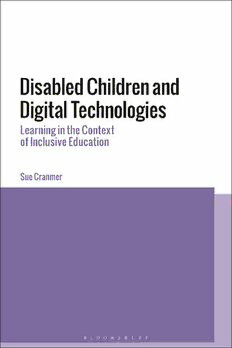Download Disabled Children and Digital Technologies: Learning in the Context of Inclusive Education PDF Free - Full Version
Download Disabled Children and Digital Technologies: Learning in the Context of Inclusive Education by Sue Cranmer in PDF format completely FREE. No registration required, no payment needed. Get instant access to this valuable resource on PDFdrive.to!
About Disabled Children and Digital Technologies: Learning in the Context of Inclusive Education
There is much evidence to suggest that children's lives have been transformed through engagement with digital technologies. Children’s uses of digital technologies such as mobile devices and the internet are currently of huge concern to academics, teachers and parents.In Disabled Children and Digital Technologies, Sue Cranmer explores the ways in which digital technologies can support or act as barriers to disabled children's learning and inclusion in mainstream schools. She provides a critical overview of how digital technologies are being used in contemporary classrooms for learning generally and by disabled children specifically. Drawing on international perspectives, the book situates disabled children’s uses and experiences of digital technologies for learning within the context of the current realities of provision of digital technologies in schools. It illustrates analysis of previous research with a recent study carried out with disabled children with visual impairments between the ages of 13 – 17 and their teachers in mainstream secondary schools to explore their experiences of learning with digital technologies.The book takes the approach of disabled children’s childhood studies that emphasises the positive, equal worth of all childhoods. Chapters consider disabled children’s uses and experiences of digital technologies for learning in relation to crucial features of digital inclusion: access, engagement, attitudes and skills, importantly including safety and risk. Perspectives are complemented by interviews with teachers to understand how disabled children’s uses of digital technologies for learning could be more effectively supported in inclusive ways in
Detailed Information
| Author: | Sue Cranmer |
|---|---|
| Publication Year: | 2021 |
| ISBN: | 9781350002074 |
| Pages: | 193 |
| Language: | English |
| File Size: | 1.318 |
| Format: | |
| Price: | FREE |
Safe & Secure Download - No registration required
Why Choose PDFdrive for Your Free Disabled Children and Digital Technologies: Learning in the Context of Inclusive Education Download?
- 100% Free: No hidden fees or subscriptions required for one book every day.
- No Registration: Immediate access is available without creating accounts for one book every day.
- Safe and Secure: Clean downloads without malware or viruses
- Multiple Formats: PDF, MOBI, Mpub,... optimized for all devices
- Educational Resource: Supporting knowledge sharing and learning
Frequently Asked Questions
Is it really free to download Disabled Children and Digital Technologies: Learning in the Context of Inclusive Education PDF?
Yes, on https://PDFdrive.to you can download Disabled Children and Digital Technologies: Learning in the Context of Inclusive Education by Sue Cranmer completely free. We don't require any payment, subscription, or registration to access this PDF file. For 3 books every day.
How can I read Disabled Children and Digital Technologies: Learning in the Context of Inclusive Education on my mobile device?
After downloading Disabled Children and Digital Technologies: Learning in the Context of Inclusive Education PDF, you can open it with any PDF reader app on your phone or tablet. We recommend using Adobe Acrobat Reader, Apple Books, or Google Play Books for the best reading experience.
Is this the full version of Disabled Children and Digital Technologies: Learning in the Context of Inclusive Education?
Yes, this is the complete PDF version of Disabled Children and Digital Technologies: Learning in the Context of Inclusive Education by Sue Cranmer. You will be able to read the entire content as in the printed version without missing any pages.
Is it legal to download Disabled Children and Digital Technologies: Learning in the Context of Inclusive Education PDF for free?
https://PDFdrive.to provides links to free educational resources available online. We do not store any files on our servers. Please be aware of copyright laws in your country before downloading.
The materials shared are intended for research, educational, and personal use in accordance with fair use principles.

